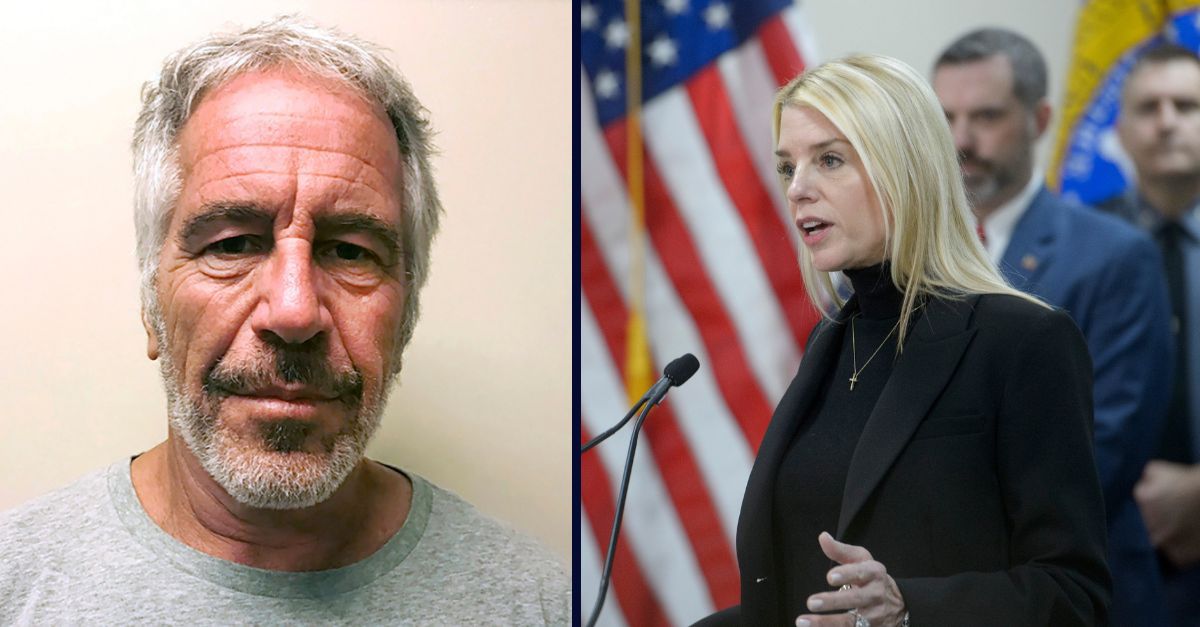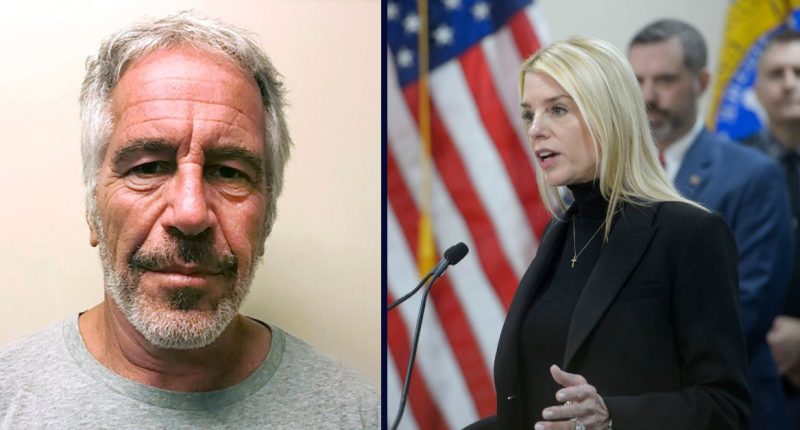
Left: Jeffrey Epstein (New York State Sex Offender Registry via AP, File); Right: Attorney General Pam Bondi speaks during a news conference at the Manassas FBI Field Office, Thursday, March 27, 2025, in Manassas, Va. (AP Photo/Rod Lamkey, Jr.)
The Trump administration is violating the Freedom of Information Act (FOIA) by refusing to release files related to Jeffrey Epstein, a lawsuit filed this week in Washington, D.C., alleges.
And the allegations are coming from a perhaps unlikely source.
In a 6-page filing, conservative government accountability group Judicial Watch accuses the U.S. Department of Justice under Attorney General Pam Bondi of violating FOIA law on a number of occasions over the past few months concerning several distinct requests.
“Simply put, the Justice Department needs to respond to public demands for transparency under law and release the Epstein files under FOIA,” Judicial Watch President Tom Fitton said in a press release announcing the litigation.
The lawsuit stems from a Feb. 21 request to the DOJ’s Office of Information Policy — a subagency dedicated to facilitating FOIA requests and government compliance with the statute.
According to the lawsuit, that FOIA request sought: “All records of communication between Attorney General Bondi and any other individual or entity regarding any lists or other records depicting the identities of clients or associates of Jeffrey Epstein. This request includes, but is not limited to, all records related to the Department’s compilation, distribution, handling, and the potential public release of any such record or the information contained therein.”
To help DOJ staff understand the salience of the request, Judicial Watch cited a Fox News article published the day before which mused Trump’s “return to the Oval Office came with the prospect of the public finally being able to see Epstein’s long-awaited ‘black book’ amid inquiries into the deceased financier and sex trafficker.”
Those hopes, however, have not been borne out.
And neither have any of the resulting FOIA requests.
While the DOJ acknowledged the first request on Feb. 27, assigned it a tracking number, and cited “unusual circumstances” to justify a 10-day extension, Judicial Watch “has received no further response” from the government, the lawsuit says.
The nonprofit watchdog had no luck with follow-up requests either.
On Feb. 27, Judicial Watch submitted two identical requests to the DOJ’s criminal division and the FBI, according to the complaint.
Those requests asked for: “All records related to Jeffrey Edward Epstein, born in New York City on January 20, 1953, and died on August 10, 2019 in New York City.”
Epstein died in federal custody while awaiting trial on sex trafficking charges. His cause of death was officially ruled a suicide; he had repeatedly been placed on suicide watch prior to dying.
Judicial Watch says both of the Feb. 27 FOIA requests were acknowledged by the government but in different ways.
In early March, the request to the criminal division was deemed “duplicative of an earlier request submitted” in 2019 and closed out, according to the lawsuit. The plaintiffs do not express any opinion on this development except to say the 2019 request was still being processed because they have “not yet received a determination.” In mid-March, the request to the FBI was acknowledged, again pushed back 10 days due to “unusual circumstances,” and again seemingly shelved with the plaintiffs having “received no further response from the FBI,” according to the lawsuit.
On Feb. 28, Judicial Watch upped the ante with a FOIA request explicitly tying their inquiry to FBI Director Kash Patel.
Patel is a longtime Trump stalwart whose confirmation push included pledges of transparency specifically regarding Epstein.
The Patel-focused FOIA request seeks:
All records of communication between Director Patel and any other individual or entity regarding any lists or other records depicting the identities of clients or associates of Jeffrey Epstein. This request includes, but is not limited to, all records related to the Department’s compilation, distribution, handling, and the potential public release of any such record or the information contained therein.
Once again, Judicial Watch says, the FBI acknowledged the request, gave itself an extension, and then went radio silent.
Love true crime? Sign up for our newsletter, The Law&Crime Docket, to get the latest real-life crime stories delivered right to your inbox.
The lawsuit says the DOJ “is in violation of FOIA” and claims irreparable harm has occurred and will continue to occur “unless Defendant is compelled to comply with FOIA’s requirements.”
The complaint seeks a court order directing the DOJ to “conduct searches for any and all records responsive to Plaintiff’s FOIA requests” and to “demonstrate that [DOJ] employed search methods reasonably likely to lead to the discovery of records responsive to the requests.”
Judicial Watch also wants the court to force the DOJ to release all relevant records covered by the FOIA requests and/or a list outlining any exemptions claimed by the agency. To that end, the plaintiffs are asking DOJ be enjoined “from continuing to withhold any and all nonexempt records responsive” to the requests.







